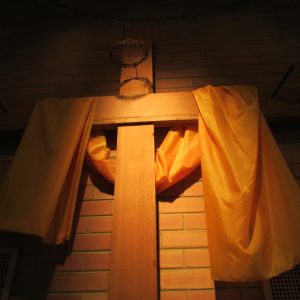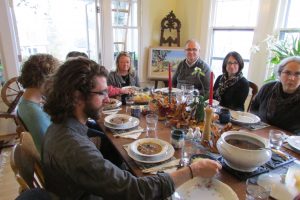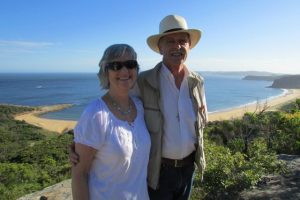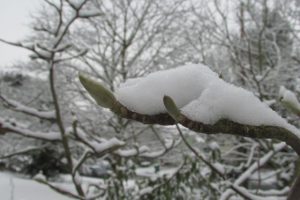Yesterday I visited the cardiologist. It is probable that my heart is OK but the mere mention of words like cardiac hypertrophy and atrial flutter made me feel my mortality as I never have before. As well as that we held an MSA Board meeting on Saturday at which we raised the question: What do Tom and I want to be doing in 5 years time? The last 24 hours have encompassed a lot of soul searching and reflecting. What do I hope to accomplish before I leave this earth?
My thoughts first went to places I want to visit – Alaska, Galapagos Islands, trans-Siberian railway, one more trip to Iona. The list could go on forever. How embarrassing that the first ideas that come to my mind are shaped by my culture and not by my faith. So with some prayer and reflection time under my belt I have come up with another list that I know I will continue to shape over the next few weeks particularly when Tom and I go on retreat next week.
- I want to grow in my faith especially in my ability to love God and my neighbours, to be more compassionate, generous and hospitable.
- I want to live in a way that is more considerate of God’s good creation and of those at the margins of society.
- I want to focus my energy on resourcing those who want to be change makers in the future. I would like to continue equipping followers of Jesus with spiritual practices, life skills and creative imaginations that strengthen their faith and their ability to reach out into God’s world. Which I think means being able to focus more on writing, and retreats as well as gardening and hospitality.
- I want to see Mustard Seed Associates grow into the Centre for Imagination and Creativity that we desire. In other words I would like to see the Mustard Seed Village constructed and rooted in an intentional community, providing a place for others to gather and imagine and create new forms of life and faith that address the challenges of tomorrow’s world.
- I want to see the Mustard Seed House continue to thrive as both a model of sustainability and as a place for gatherings where people can be strengthened in their faith and life. Part of the uniqueness of MSA is our desire to develop both an urban and a rural community as places to gather and create as well as to model sustainable life and sustainable faith.
Part of what grappling with my own mortality has done for me is to help me focus on what is important. I realize how easily all of us are conditioned by a culture that tells us buying and consuming are our main purpose. But as followers of Christ that should not be the case. Above all else, I want to be faithful to God’s call on my life. When I do come to the end of my life, I want to be able to look back without regrets.
What about you? What does your bucket list look like and how does that reflect God’s calling on your life?
As you know we have a lot happening at MSA for the season of Lent. Why you might ask? This is not a tradition that many of our protestant churches practice. But I think it should be. Lent is about preparing your heart for the coming of Christ. So we do hope you will join us. And if you are in Seattle come get your heart prepared for journey with a day of reflection and refocusing. This year’s retreat is a full day because last year so many people commented “It wasn’t long enough”. If you would like to attend the morning sessions only let us know.
When: March 1st, 2014 9:30a.m. – 4:00p.m.
Where: The Mustard Seed House, Seattle, WA (510 NE 81st St.)
I will facilitate this MSA retreat which was very popular last year. The season of Lent awakens in all of us a hunger for deeper intimacy with God. Yet we are often distracted by busyness, worry and work.
At this retreat we will explore the simple things of everyday life – breathing, drinking a glass of water, running, picking up a stone or taking a photo – that open our senses to the God who shines through every moment and enlivens every creature.
We will spend time developing spiritual practices for the season of Lent and beyond and we will spend time in quiet reflection as well. We might even work on starting our Lenten gardens.
Cost: $50 (includes lunch)
Add a copy of A Journey Into Wholeness: Soul Travel from Lent to Easter for only $12
REGISTER HERE.
This morning I read an interesting article from YES magazine entitled Relearning the Skills of Community. As I read about their check in time, and provision of mutual support I thought – that sounds very much like forming Christian community to me. That’s what we do in our MSA team meetings. That’s what movements like the New Monasticism and Parish Collective are trying to accomplish.
I have the same response when I read books like Imagination First and Business Secrets of the Trappist Monks. And when I hear that young social entrepreneurs are living in community, practicing mindfulness and holding each other responsible I think – that sounds like spiritual disciplines without the spirit. But then I think is it really without the spirit?
Then I get together with the Food and Faith Initiative Steering Committee of Seattle Tilth’s Just Garden Project. As we talk about churches, synagogues, mosques and Hindu temples growing food and helping to sustain those at the margins with their produce, I think: This is God at work.
I believe that all of these movements are God at work. Young millennials are leaving the established churches in droves. As consultant Kn Moy shared with us recently:
The largest generation in U.S. history — the 80 million Millennials — has come to view religion (and the Bible) as judgmental, homophobic, hypocritical, and too political. Today, only ten percent of Millennials are “religiously affiliated.” Of that number, 59 percent will become “religiously unaffiliated” before they enter college. (That is, they will leave their churches.) And, unlike the Boomers, they will not re-affiliate when they marry and have children. So, basically, the Church, as we know it, will disappear in a couple of generations.
God has not abandoned the young millennials, or the millions from other generations who have left the church in the last few decades. God is at work spreading the salt of the kingdom throughout the world. I think that we need to be less about trying to get people into church and more about trying to help them recognize the presence of God in their everyday lives. Helping to recognize the ways that mindful meditation draws us close to the living God is an important part of what followers of Christ have to offer today. Helping seekers after community to draw close to the love of God which is at the centre of their interactions, even if they don’t see that, is hugely important. Helping those who love to get their hands dirty in a garden to interact with God and story of God that are revealed in their labours is a wonderful achievement.
Not all followers of Christ call themselves Christians and I suspect that even less will do so in the future. But the spirit of God is still very much at work transforming, renewing and making all things whole. My question is: will be recognize this and join in, or will we stand back because it does not fit our preconceptions of how God operates.
God rarely works according to our plans. The Jews looked for a powerful king who would triumphantly lead them into the glory days of a physical kingdom. They got a humble servant instead whose kingdom was ushered in through the renewal of suffering, death and resurrection.
I wonder how often we miss what God is doing because we assume we know what the next steps will be. Perhaps it is time for all of us to look around and ask:
God what are you doing and how can I be a part of it?
One of my biggest challenges during this season of the year is the tension between my preparations for Lent and my commitment to gardening. I so often feel that these two interests are at loggerheads. This year, however, I have spent a lot of time thinking about how I could combine my interests and decided to make a Lenten garden.
Over the last couple of weeks, I have researched Lenten gardens and found some interesting suggestions. Like this one made from sand, purple tea lights and stones to assist evening prayers.
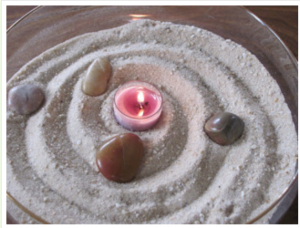
http://fromthesheepfold.blogspot.com/2012/03/try-this-lenten-prayer-garden.html
I particularly enjoyed this Lenten wreath which my imagination immediately transposed into a Lenten garden.
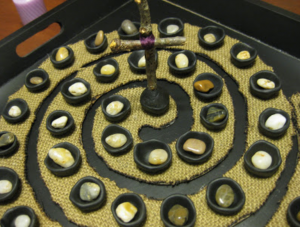
Lenten wreath from http://www.weelittlemiracles.com/2011/03/idea-for-your-family-this-lent.html
However, I also struggled because none of the “gardens” I came across had any plants in them. They all represented sterile, lifeless deserts.
But, deserts are not lifeless, and the journey to the Cross isn’t lifeless either. Gardening, too, is a journey from brokenness to transformation, an exciting, hope filled journey that reminds us God is in the business of transformation. So here are my ideas for a Lenten garden which I intend to experiment with in the next couple of weeks.
Suggestion 1: Fill a bowl with compost – reminding yourself continually that this is garbage transformed. Decorate your bowl with stones or crosses or other reminders of the journey of Jesus towards the Cross. Take some seeds and sprinkle them with water in the name of the Creator, redeemer and sustainer. Allow them to soak overnight and then bury them in your garden, reminding yourself of the One who was buried in the darkness of death for us. Watch them sprout into life as you journey towards Easter and the resurrection.
Suggestion 2: Start with that sandy sterile garden and each Sunday during Lent plant a new plant in your garden. I suggest doing this on Sunday because Sundays are not part of the Lenten journey. Sunday is always a celebration of the resurrection. Planting something in your Lenten garden each week like this sounds like a great reminder of the meaning of Easter. Even thinking about it stirs my heart with longing for the completion of the Easter story.
I think that these are wonderful ways to creatively connect your own experiences of gardening and the Easter story together. This kind of congruence between our daily activities and the story of God strengthens our faith and stabilizes our lives.
So what are your ideas for bringing gardening and Lent together this year? I hope that you will share them with us.
This morning I was very frustrated. My phone and computer calendars have not been in synch since my return from Australia. I have spent the morning rescheduling appointments and grumbling. My mood was not improved by the fact that my body clock is still out of synch too. As I look out on a wet Seattle morning with the snow turning to slush, I think longingly of the 85F days I left behind in Australia less than a week ago.
Then I read Andy Wade’s great article Have You Tried Turning It Off and On Again? That’s the problem I realized. Not only has my phone been on constantly since my return but my life has been too. Catching up after almost three weeks away takes a lot of time and effort and it is easy not to take the time to refresh and resynch my life. Taking time to breathe in deeply the fragrance of God’s love. Relishing the joy of being back with our dog Bonnie who is once more full of life. Drinking in the beauty of a winter shrouded landscape. These are the things that resynch my life, the things that make me feel I have switched off and switched on again.
For Andy Sabbath is a discipline that reboots his system. Lent is too. I appreciated his reminder of this. It is easy for me to focus on what I am encouraging others to do for Lent and not enter fully into the season myself. Andy explains:
It used to be that Lent was more of a private journey for me. But over the years I’ve begun to appreciate how important it is to walk this journey together. You see, it turns out we’re not a bunch of individual computers that can simply be turned off and on again. There’s something embedded in our humanness that causes us to quickly revert back to the old operating system with all its old viruses and bugs. It turns out that we need to walk this journey together because others can see what we fail to see… refuse to see… that all we really did was turn the system off and on again, but nothing actually changed. (Read the article here)
So what does this look like for you? Although Lent is still a month away, here at Mustard Seed Associates we’re already preparing. I’m looking forward to our Return to Our Senses in Lent retreat. I am also looking forward to exploring together as a team A Journey Into Wholeness and to reflecting on the blog series with posts from many collaborators around the world. This is always an important season of reflection for me, but I definitely needed this reminder today that I need a spiritual reboot. And in case you are wondering all I needed to do to resynch my phone and computer calendars was to switch the phone off and on again.
How do you conduct a spiritual re-boot?
Take time to listen to St Matthew’s Passion as preparation for Lent and Holy week
You may also like to check out the more extensive list of Music Resources for Lent and the other resource lists in this series
Closer to Holy Week I will post another set of resources for Palm Sunday and beyond.
And don’t forget to check out the MSA resources:
Our latest resource, 40+ Activities for Lent and Easter, which can be downloaded for free from the MSA website. This guide is designed to be used in conjunction with our other new resources (below) or as a stand alone guide:
- A Journey Into Wholeness: Soul Travel From Lent to Easter – now available in paper and e-book form
- Lenten Prayer cards
- Daily reflections that will be posted on the Godspace blog and also on the Facebook page, Coming Home to the Story of God
This post is out of date, please see our current version here.
With Lent only a few weeks away, I know that many of my readers are already looking for scripture plans and devotional books to read, so I thought that this year I would start early with listing Lenten resources. This year, I am starting with possible plans for daily scripture readings. Obviously there are hundreds out there. Written, online, downloadable you choose. I have tried to provide these from a number of theological backgrounds. If there are others you think should be on the list please let me know. And by the way the photo is of a 500 year old Bible – seemed appropriate for the season especially (at least to me) that though the method we use to study may change, the message is timeless.
Daily Readings
Sacred Space – Daily Prayer with the Irish Jesuits
Pray as You Go – also from the Jesuits. Daily prayer for portable MP3 players.
Biblegateway.com’s Reading plan for Lent – can also be downloaded as an app.
Church Father’s Lenten Reading Plan
A Reading Plan for lent and Easter from the Salvation Army
Download The Bible App – The plans deliver a relevant scripture verse to users each day that are themed around the topic selected by the user with one specifically for Lent.
An interesting 5 apps for Lent from ccr.org.uk.
Seven Apps to Help You Through Lent
The Daily Office From the Book of Common Prayer
Presbyterian USA daily readings
The Daily Office from the Episcopal Church US
Reflections from Forward Day by Day
Godspace Resource Lists
A series on Lent and creativity:
Our new free download: What Do You Hunger For: Creative Exercises for Lent
Get Creative and Play Games for Lent;
Five Ways to Foster Creativity in Kids During Lent
Seven Tips for Creating Sacred Space For Lent
Let’s Get Creative – Doodle Your Way Through the Lenten Calendar
Meditation Videos
Were You There When They Crucified My Lord? This meditation is designed for Good Friday and does not have music.
Lenten Reflection Video by Christine Sine
As an Amazon Associate, I receive a small amount for purchases made through appropriate links.
Thank you for supporting Godspace in this way.
When referencing or quoting Godspace Light, please be sure to include the Author (Christine Sine unless otherwise noted), the Title of the article or resource, the Source link where appropriate, and ©Godspacelight.com. Thank you!


